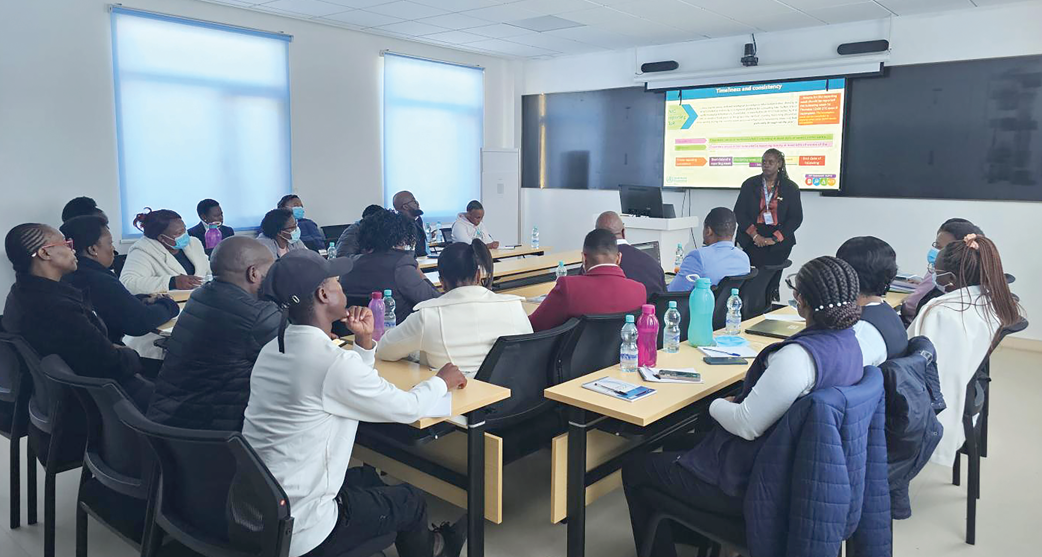Lesotho has become the first country in the World Health Organization (WHO) African Region to pilot the Afro Influenza (AFFLU) surveillance platform, an advanced initiative aimed at strengthening national health surveillance systems.
Developed by WHO for the African region, AFFLU is an adaptation of the EMFLU platform used in the Eastern Mediterranean. It is designed to enhance the collection, management, and analysis of both aggregate and case-based data on influenza and other respiratory viruses (ORVs).
This new platform marks a significant milestone in health data management, enabling seamless sharing of epidemiological and virological information, streamlining workflows, and improving data quality at all levels of the health system.
Muza Tendai, Information Systems Specialist at the WHO Regional Office for Africa (AFRO), emphasised the platform’s transformative potential.
“This surveillance platform will strengthen the country’s respiratory disease surveillance and allow integration with other systems and datasets. It will offer real-time, advanced data analytics tailored to regional and country-specific needs,” said Tendai.
To support the platform’s successful implementation, WHO has trained 18 end-users in Lesotho. These individuals will collect and manage real-time data from four selected surveillance sites in and around Maseru. This hands-on training is essential to ensuring accurate data collection and effective platform usage.
Dr. Lieketseng Petlane, speaking on behalf of the Director General of Health Services at the Ministry of Health, expressed deep appreciation for Lesotho’s selection as the pilot country.
“The Ministry of Health is deeply grateful and honoured that Lesotho is considered and supported to pilot this vital surveillance and diagnostic platform. COVID-19 taught us hard lessons and exposed gaps in our health system, particularly in diagnostics and timely response. This initiative will help close those gaps by strengthening surveillance, building human resource capacity, and boosting the resilience of our integrated health system,” Dr. Petlane stated.
The AFFLU platform is expected to have a profound impact on Lesotho’s health surveillance system.
Malefane Thamae, Maseru District Surveillance Officer, highlighted the benefits of this development.
“This will help us in the early detection of an outbreak, hence improved Rapid Response to affected areas. It will provide our office with rapid access to countermeasures, such as the provision of appropriate vaccines,” Thamae explained.
According to WHO, Lesotho’s pioneering efforts in piloting the AFFLU surveillance platform underscore the country’s commitment to advancing its health infrastructure. By leveraging this innovative technology, Lesotho is poised to enhance its capacity to respond to respiratory diseases, ultimately improving public health outcomes for its citizens.
“As the pilot program progresses, the insights gained from Lesotho’s experience will be invaluable for other African nations looking to adopt similar surveillance tools.”
“The AFFLU platform not only represents a significant technological advancement but also a promising development for improved health surveillance and response across the continent,” WHO stated.
Summary
- Lesotho has become the first country in the World Health Organization (WHO) African Region to pilot the Afro Influenza (AFFLU) surveillance platform, an advanced initiative aimed at strengthening national health surveillance systems.
- This new platform marks a significant milestone in health data management, enabling seamless sharing of epidemiological and virological information, streamlining workflows, and improving data quality at all levels of the health system.
- Lieketseng Petlane, speaking on behalf of the Director General of Health Services at the Ministry of Health, expressed deep appreciation for Lesotho’s selection as the pilot country.

Ntsoaki Motaung is an award-winning health journalist from Lesotho, specializing in community health stories with a focus on sexual and reproductive health and rights, as well as HIV. She has contributed to platforms like “Be in the KNOW,” highlighting issues such as the exclusion of people with disabilities from HIV prevention efforts in Lesotho.
In addition to her journalism, Ntsoaki serves as the Country Coordinator for the Regional Media Action Plan Support Network (REMAPSEN). She is also a 2023 CPHIA Journalism Fellow.







